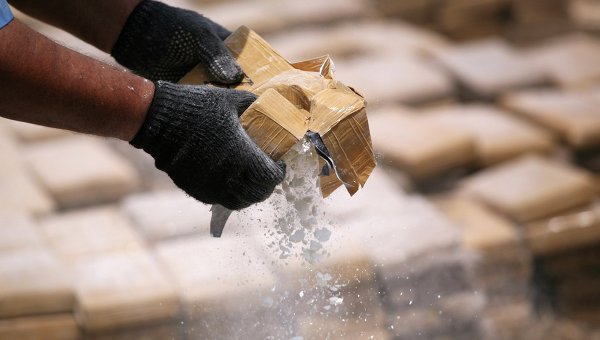Occupied Nagorno-Karabakh seen as regional hub for drug trafficking

By Sara Rajabova
Azerbaijan's Nagorno-Karabakh region occupied by Armenia has turned into a regional center of drug production and trafficking, says a brochure published by the Azerbaijan National Anti-drugs Propaganda Office, acting within the framework of the UN Development Programme (UNDP).
An analytical expert group of the Office has studied processes with reference to various information sources and prepared as a result the special brochure called "Drug trafficking in Nagorno-Karabakh," which reflects the situation with drugs in the occupied territories of Azerbaijan.
Azerbaijan is taking various measures to combat drug trafficking and drug addiction. Moreover, the use of the occupied Azerbaijani territories for drug trafficking is a serious concern.
According to the publication, there are facts provided by various sources about drug trafficking through Nagorno-Karabakh, which is an integral part of Azerbaijan, to neighboring Russia and Europe.
"Whereas previously the occupied Nagorno-Karabakh was used as a transit territory for drug trafficking, now the production of narcotic substances, which are then exported to the Russian and European markets, was launched in this territory," the publication said.
The testimony of a criminal group exposed a while ago as a result of a successful operation by officers of the Ministry of National Security once again confirmed that the territory of Nagorno-Karabakh is not only used for drug trafficking from south to north, but at the same time is exploited for cultivation and recycling of narcotic plants, the publication says.
Authors of the research believe that drug trafficking in Nagorno-Karabakh brings Armenia enormous profits, and the funds are spent to finance extremist forces, the support of the armed groups and the purchase of weapons.
The route of drug trafficking, which lies through the territory of Nagorno-Karabakh, also stands in the way of a settlement to the Nagorno-Karabakh conflict between Armenia and Azerbaijan and adversely affects the security of the entire region.
The publication also said that Azerbaijan cooperates with international organizations and individual countries in both bilateral and multilateral formats to combat drug trafficking in the occupied territories.
However, due to the fact that the territory of Nagorno-Karabakh and surrounding regions are under occupation of the neighboring state, the Azerbaijani law enforcement bodies do not have the capacity to effectively monitor these areas. This makes Nagorno-Karabakh an uncontrolled territory where criminal activity thrives, the publication said.
It is planned to circulate the brochure, which was published in Russian and English, in the diplomatic missions accredited in Azerbaijan and to attract international attention to this acute problem through the Foreign Ministry and the embassies of Azerbaijan abroad.
The National Office also said it is merely the first step and in the next stages it is planned to prepare a report on the basis of the collected information and then work will be undertaken for the inclusion of this information in a 2013 report on the situation with drugs in the world.
It also believes that the threat posed to the development of the countries of the region and the lives of people, and international unity, stemming from illegal drug production in Nagorno-Karabakh, represents biological terrorism, and calls for more drastic measures to prevent it.
Azerbaijani officials and representatives of international organizations have repeatedly made well-founded statements about the use of the occupied territories for drug production.
Given the urgency of the problem of controlling illicit trafficking, intensive work is underway in Azerbaijan to establish legal basis for combating such crimes.
Azerbaijan has joined the 1961, 1971 and 1988 UN conventions on narcotic drugs, psychotropic substances and the fight against illegal circulation of precursors, and concluded bilateral and multilateral agreements and memoranda with a number of countries on combating drugs.
Besides the three UN conventions, Azerbaijan is party to the Partial Agreement establishing the Pompidou Group of the Council of Europe on cooperation in combating drug abuse and trafficking in drugs.
Over 20 percent of Azerbaijan's internationally recognized territory, including Nagorno-Karabakh and seven adjacent regions, has been occupied by Armenian armed forces since a lengthy war between the two South Caucasus countries in the early 1990s. The UN Security Council has passed four resolutions calling for an Armenian pullout, but they have not been enforced to date.
